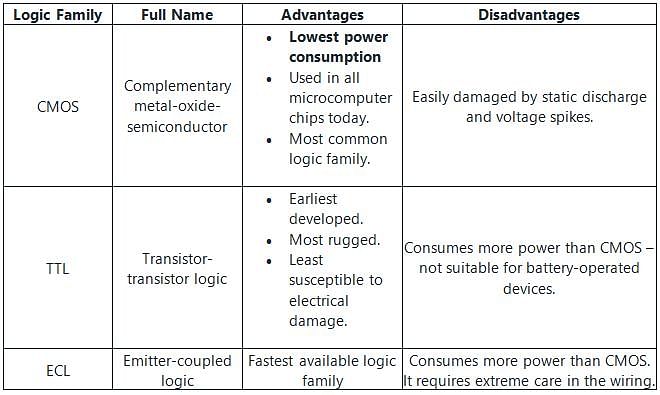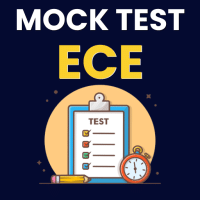Electronics and Communication Engineering (ECE) Exam > Electronics and Communication Engineering (ECE) Questions > The full forms of the abbreviations TTL and C...
Start Learning for Free
The full forms of the abbreviations TTL and CMOS in reference to logic families are
- a)Triple Transistor Logic and Chip Metal Oxide Semiconductor
- b)Tristate Transistor Logic and Chip Metal Oxide Semiconductor
- c)Transistor Transistor Logic and Complementary Metal Oxide Semiconductor
- d)Tristate Transistor Logic and Complementary metal Oxide Silicon
Correct answer is option 'C'. Can you explain this answer?
| FREE This question is part of | Download PDF Attempt this Test |
Most Upvoted Answer
The full forms of the abbreviations TTL and CMOS in reference to logic...
TTL stands for Transistor-Transistor Logic and CMOS stands for Complimentary Metal Oxide Semiconductor.


Free Test
FREE
| Start Free Test |
Community Answer
The full forms of the abbreviations TTL and CMOS in reference to logic...
Understanding TTL and CMOS
TTL and CMOS are two widely used logic families in digital electronics, each with distinct characteristics and applications.
TTL: Transistor-Transistor Logic
- TTL stands for Transistor-Transistor Logic.
- It uses multiple transistors to perform logical operations, where both the logic gates and the output stages are constructed from bipolar junction transistors (BJTs).
- TTL is known for its speed and ease of use, making it a popular choice in various applications, particularly in older electronic devices.
CMOS: Complementary Metal-Oxide-Semiconductor
- CMOS stands for Complementary Metal-Oxide-Semiconductor.
- This technology employs both p-type and n-type MOSFETs (metal-oxide-semiconductor field-effect transistors) to create logic functions.
- CMOS technology is highly valued for its low power consumption, high noise immunity, and scalability, making it ideal for modern digital circuits, including microprocessors and memory devices.
Key Differences and Applications
- Power Consumption: TTL generally consumes more power compared to CMOS, especially when idle. CMOS, on the other hand, consumes very little power, making it suitable for battery-operated devices.
- Speed: TTL can operate at higher speeds compared to traditional CMOS, but advancements in CMOS technology have narrowed this gap significantly.
- Integration: CMOS technology allows for higher integration density, which is essential for modern integrated circuits.
Conclusion
The correct answer to the question is option 'C' because it accurately defines TTL as Transistor-Transistor Logic and CMOS as Complementary Metal-Oxide-Semiconductor, reflecting the fundamental technologies behind these logic families.
TTL and CMOS are two widely used logic families in digital electronics, each with distinct characteristics and applications.
TTL: Transistor-Transistor Logic
- TTL stands for Transistor-Transistor Logic.
- It uses multiple transistors to perform logical operations, where both the logic gates and the output stages are constructed from bipolar junction transistors (BJTs).
- TTL is known for its speed and ease of use, making it a popular choice in various applications, particularly in older electronic devices.
CMOS: Complementary Metal-Oxide-Semiconductor
- CMOS stands for Complementary Metal-Oxide-Semiconductor.
- This technology employs both p-type and n-type MOSFETs (metal-oxide-semiconductor field-effect transistors) to create logic functions.
- CMOS technology is highly valued for its low power consumption, high noise immunity, and scalability, making it ideal for modern digital circuits, including microprocessors and memory devices.
Key Differences and Applications
- Power Consumption: TTL generally consumes more power compared to CMOS, especially when idle. CMOS, on the other hand, consumes very little power, making it suitable for battery-operated devices.
- Speed: TTL can operate at higher speeds compared to traditional CMOS, but advancements in CMOS technology have narrowed this gap significantly.
- Integration: CMOS technology allows for higher integration density, which is essential for modern integrated circuits.
Conclusion
The correct answer to the question is option 'C' because it accurately defines TTL as Transistor-Transistor Logic and CMOS as Complementary Metal-Oxide-Semiconductor, reflecting the fundamental technologies behind these logic families.
Attention Electronics and Communication Engineering (ECE) Students!
To make sure you are not studying endlessly, EduRev has designed Electronics and Communication Engineering (ECE) study material, with Structured Courses, Videos, & Test Series. Plus get personalized analysis, doubt solving and improvement plans to achieve a great score in Electronics and Communication Engineering (ECE).

|
Explore Courses for Electronics and Communication Engineering (ECE) exam
|

|
The full forms of the abbreviations TTL and CMOS in reference to logic families area)Triple Transistor Logic and Chip Metal Oxide Semiconductorb)Tristate Transistor Logic and Chip Metal Oxide Semiconductorc)Transistor Transistor Logic and Complementary Metal Oxide Semiconductord)Tristate Transistor Logic and Complementary metal Oxide SiliconCorrect answer is option 'C'. Can you explain this answer?
Question Description
The full forms of the abbreviations TTL and CMOS in reference to logic families area)Triple Transistor Logic and Chip Metal Oxide Semiconductorb)Tristate Transistor Logic and Chip Metal Oxide Semiconductorc)Transistor Transistor Logic and Complementary Metal Oxide Semiconductord)Tristate Transistor Logic and Complementary metal Oxide SiliconCorrect answer is option 'C'. Can you explain this answer? for Electronics and Communication Engineering (ECE) 2024 is part of Electronics and Communication Engineering (ECE) preparation. The Question and answers have been prepared according to the Electronics and Communication Engineering (ECE) exam syllabus. Information about The full forms of the abbreviations TTL and CMOS in reference to logic families area)Triple Transistor Logic and Chip Metal Oxide Semiconductorb)Tristate Transistor Logic and Chip Metal Oxide Semiconductorc)Transistor Transistor Logic and Complementary Metal Oxide Semiconductord)Tristate Transistor Logic and Complementary metal Oxide SiliconCorrect answer is option 'C'. Can you explain this answer? covers all topics & solutions for Electronics and Communication Engineering (ECE) 2024 Exam. Find important definitions, questions, meanings, examples, exercises and tests below for The full forms of the abbreviations TTL and CMOS in reference to logic families area)Triple Transistor Logic and Chip Metal Oxide Semiconductorb)Tristate Transistor Logic and Chip Metal Oxide Semiconductorc)Transistor Transistor Logic and Complementary Metal Oxide Semiconductord)Tristate Transistor Logic and Complementary metal Oxide SiliconCorrect answer is option 'C'. Can you explain this answer?.
The full forms of the abbreviations TTL and CMOS in reference to logic families area)Triple Transistor Logic and Chip Metal Oxide Semiconductorb)Tristate Transistor Logic and Chip Metal Oxide Semiconductorc)Transistor Transistor Logic and Complementary Metal Oxide Semiconductord)Tristate Transistor Logic and Complementary metal Oxide SiliconCorrect answer is option 'C'. Can you explain this answer? for Electronics and Communication Engineering (ECE) 2024 is part of Electronics and Communication Engineering (ECE) preparation. The Question and answers have been prepared according to the Electronics and Communication Engineering (ECE) exam syllabus. Information about The full forms of the abbreviations TTL and CMOS in reference to logic families area)Triple Transistor Logic and Chip Metal Oxide Semiconductorb)Tristate Transistor Logic and Chip Metal Oxide Semiconductorc)Transistor Transistor Logic and Complementary Metal Oxide Semiconductord)Tristate Transistor Logic and Complementary metal Oxide SiliconCorrect answer is option 'C'. Can you explain this answer? covers all topics & solutions for Electronics and Communication Engineering (ECE) 2024 Exam. Find important definitions, questions, meanings, examples, exercises and tests below for The full forms of the abbreviations TTL and CMOS in reference to logic families area)Triple Transistor Logic and Chip Metal Oxide Semiconductorb)Tristate Transistor Logic and Chip Metal Oxide Semiconductorc)Transistor Transistor Logic and Complementary Metal Oxide Semiconductord)Tristate Transistor Logic and Complementary metal Oxide SiliconCorrect answer is option 'C'. Can you explain this answer?.
Solutions for The full forms of the abbreviations TTL and CMOS in reference to logic families area)Triple Transistor Logic and Chip Metal Oxide Semiconductorb)Tristate Transistor Logic and Chip Metal Oxide Semiconductorc)Transistor Transistor Logic and Complementary Metal Oxide Semiconductord)Tristate Transistor Logic and Complementary metal Oxide SiliconCorrect answer is option 'C'. Can you explain this answer? in English & in Hindi are available as part of our courses for Electronics and Communication Engineering (ECE).
Download more important topics, notes, lectures and mock test series for Electronics and Communication Engineering (ECE) Exam by signing up for free.
Here you can find the meaning of The full forms of the abbreviations TTL and CMOS in reference to logic families area)Triple Transistor Logic and Chip Metal Oxide Semiconductorb)Tristate Transistor Logic and Chip Metal Oxide Semiconductorc)Transistor Transistor Logic and Complementary Metal Oxide Semiconductord)Tristate Transistor Logic and Complementary metal Oxide SiliconCorrect answer is option 'C'. Can you explain this answer? defined & explained in the simplest way possible. Besides giving the explanation of
The full forms of the abbreviations TTL and CMOS in reference to logic families area)Triple Transistor Logic and Chip Metal Oxide Semiconductorb)Tristate Transistor Logic and Chip Metal Oxide Semiconductorc)Transistor Transistor Logic and Complementary Metal Oxide Semiconductord)Tristate Transistor Logic and Complementary metal Oxide SiliconCorrect answer is option 'C'. Can you explain this answer?, a detailed solution for The full forms of the abbreviations TTL and CMOS in reference to logic families area)Triple Transistor Logic and Chip Metal Oxide Semiconductorb)Tristate Transistor Logic and Chip Metal Oxide Semiconductorc)Transistor Transistor Logic and Complementary Metal Oxide Semiconductord)Tristate Transistor Logic and Complementary metal Oxide SiliconCorrect answer is option 'C'. Can you explain this answer? has been provided alongside types of The full forms of the abbreviations TTL and CMOS in reference to logic families area)Triple Transistor Logic and Chip Metal Oxide Semiconductorb)Tristate Transistor Logic and Chip Metal Oxide Semiconductorc)Transistor Transistor Logic and Complementary Metal Oxide Semiconductord)Tristate Transistor Logic and Complementary metal Oxide SiliconCorrect answer is option 'C'. Can you explain this answer? theory, EduRev gives you an
ample number of questions to practice The full forms of the abbreviations TTL and CMOS in reference to logic families area)Triple Transistor Logic and Chip Metal Oxide Semiconductorb)Tristate Transistor Logic and Chip Metal Oxide Semiconductorc)Transistor Transistor Logic and Complementary Metal Oxide Semiconductord)Tristate Transistor Logic and Complementary metal Oxide SiliconCorrect answer is option 'C'. Can you explain this answer? tests, examples and also practice Electronics and Communication Engineering (ECE) tests.

|
Explore Courses for Electronics and Communication Engineering (ECE) exam
|

|
Suggested Free Tests
Signup for Free!
Signup to see your scores go up within 7 days! Learn & Practice with 1000+ FREE Notes, Videos & Tests.






















